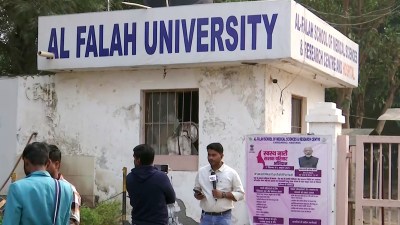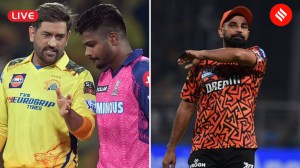An honourable farewell
Mohommed Shareef,a cycle mechanic in Faizabad,lives by a vow he took after his sons death: that he would perform the funeral rites for those who had nobody to bury or cremate them.
March 4,1992. Mohommed Shareef,an unlettered cycle mechanic,waved his son,Raees,goodbye as the latter drove on his motorbike to the railway station,to catch a train to Sultanpur. Shareef,a resident of Faizabad,a small town in UP known more due to its proximity to its twin town of Ayodhya,was proud of Raees,the first in his poor,uneducated family to have become a doctor.
Shareef got worried when he didnt receive a call from Raees to inform him whether hed reached Sultanpur. After a few days spent waiting for that call,Shareef went to a police station to report about his missing son. A month later,the police told him about an unclaimed body that had been found near the railway tracks in Sultanpur. The police had buried the body but kept the clothesa striped shirt and a trouser. The tailors tag on the blood-stained shirt said it had been stitched in Faizabad. Shareef was called to identify it. It was the same shirt he saw 21-year-old Raees last wearing.
As much as his sons mysterious death haunted Shareef,so did the fact that he had not been able to bury him with his own hands. So,on that day in April 1992,Shareef took a vow: I decided to take care of dying people and to perform the funeral rites for those who had nobody to bury or cremate them, he says,as he shows us a framed picture of his son. The striped shirt Raees was wearing in the photo is the same ill-fated one,says a teary-eyed Shareef.
More than 18 years on,Shareef has performed the funeral rites of over 1,500 unclaimed bodies1,000 Hindu corpses and the rest Muslimand has attended to several thousand destitute patients in the emergency ward of the district hospital in Faizabad. He gets up at 5 a.m. every day,packs food and goes to the hospital to feed the destitute patients and assists nurses in attending to them. He then goes to his cycle repair shop,which earns him Rs 6,000 a month,with which he feeds his family of five members. He is back in the hospital for another round of nursing. In between,he receives phone calls from the police,asking him to help them perform the funeral of an unclaimed dead person.
The police have given him a mobile phone to help them. Whenever theres a call,he shuts his shop,collects the shroud and takes his cart to the police station. There,he gets a letter from the police,authorising him to perform the funeral rites. After that,he lifts the corpse,puts it in a sack,takes it to the cremation ground and hands it to the priest,if the body is that of a Hindu. If the body is that of a Muslim,he takes it to the graveyard where he washes the body before wrapping it in a cloth and burying it.
A committee of 11 local businessmen donates money to Shareef when he needs it for funerals. On an average,he needs between Rs 500 to Rs 1,000 per body,with which he buys shrouds,sacks,and wooden stacks.
After Shareef had a kidney operation two years ago,the 70-year-old found it difficult to move about. So,he bought three carts for Rs 6,000 and hired three men to help transport the corpses. He has his carts placed at strategic placesoutside the police post at the railway stations in Faizabad and Ayodhya,and outside the district hospital in Faizabad.
Doesnt the sight of bodies,mostly mutilated by a road or train accident,affect him? It always does. I have sleepless nights too,but I find the strength to carry on in the larger interest of giving someone an honourable farewell. I would rather feel the pain than let the corpse rot or have the dogs feed on it, he says.
Shareef had also buried the bodies of the militants who had set out to attack the makeshift temple at the Ram Janmabhoomi site before they were killed in an encounter in 2005,though he refuses to talk about it much,except for acknowledging that he had buried them. I was asked by the police to do so, he says,and shows as proof a document signed by the cops authorising the burial.
Today,there are 25 signboards in Faizabad and about four in Ayodhya,asking people to contact Shareef if they find an unclaimed corpse. He is well-known in the twin cities and is popularly called Shareef Chacha. But his two grown-up sons,one a cycle mechanic and the other a driver,dont share their fathers passion. So the committee that funds Shareefs work has been trying to find people to do similar work,says SM Subhani,a member. Only Shareef has the heart and dedication to wash a beheaded body,to assemble broken parts,to wrap them neatly in a cloth and stitch it over. I think this tradition will die with him, says Subhani.



- 01
- 02
- 03
- 04
- 05



























